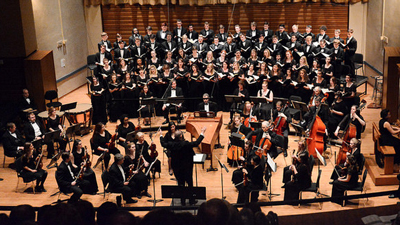by David Kulma

With eleven movements and five soloists, Jesu, meine Freude, BWV 227 is Bach’s most complex motet, alternating six settings of Johann Crüger’s hymn with biblical quotes from the Book of Romans. Garner gave this elaborate work a powerful sweep. Especially wonderful was the Motet Choir’s darkly transparent singing in the sixth-movement fugue. Sopranos Sarah Hawkey and Kia Frank, alto Andrew Cooper, tenor John Russell, and baritone Christopher Jackson sang excellent solos, and the combined beauty of the four upper voices was magical in the ninth movement. Jason Aquila ably undergirded both of these chorus-focused motets with his continuo playing on a large chamber organ.
The Motet Choir was joined by the Festival Chamber Orchestra after intermission. O Jesu Christ, meins Lebens Licht, BWV 118 is technically a motet, but with its instrumental accompaniment, it has all the dressings of a short cantata. Using a chorale text by Martin Behm — “O Jesus Christ, light of my life” — this celebratory work was performed in its string version with harpsichord. The ensemble was a little tentative at first, but soon settled into a joyfully lilting flow.
The one true cantata, Christ lag in Todes Banden, BWV 4, ended the evening. This memorable, Easter-themed drama for choir, soloists, strings, and continuo begins with a short sinfonia followed by the seven verses of a Martin Luther hymn. The lower voiced soloists were the standouts. Tenor Gene Stenger was forthright and intense in the third verse, and Jackson impressively florid in the fifth. The Motet Choir and soloists sounded wonderful throughout. Mixing straight-tone with some vibrato, they collectively painted a dramatic portrait. Despite some errors of intonation, the quasi-period Festival Orchestra was generally light-footed and capable in accompaniment, shaping the backdrop for the intense singing.
Published on ClevelandClassical.com April 24, 2019.
Click here for a printable copy of this article


